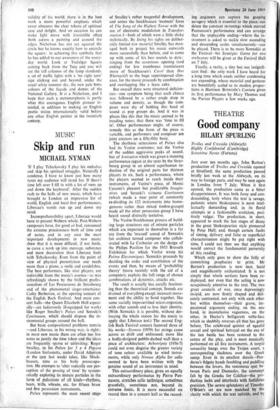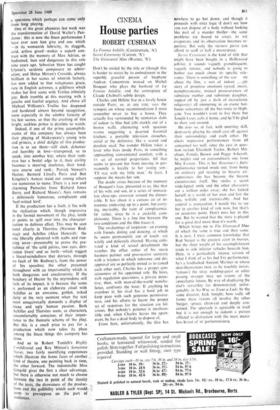THEATRE
Good company
HILARY SPURLING
Troilus and Cressida (Aldwych) Highly Confidential (Cambridge) Sometime Never (Fortune) Just over ten months ago, John Barton's production of Troilus and Cressida opened at Stratford; the same production paused briefly last week at the Aldwych, on its way to foreign parts, and may be seen again in London from 7 July. When it first opened, the production came as a bitter disappointment. It was both fussy and con- descending, testy where the text is savage, pedantic where Shakespeare is most intel- lectually demanding and, in its florid attempts at a fashionable eroticism, posi- tively vulgar. The production, in short, appeared to mark the last stages of decay in the great Shakespearian style pioneered by Peter Hall; and, though certain faults of timing, delivery and false or superficial characterisation might be put right with time, I could not then see that anything would correct the fundamental perversity of this reading.
Which only goes to show the folly of committing prophecies to print. Mr Barton's production is now taut, lucid and magnificently orchestrated. It is not simply that whole sections have been re- deployed, nor even that the acting is now scrupulously attentive to the text. The two great councils of war, once depressingly insipid, are now fumly shaped and deli- cately contrasted, not only with each other but within themselves—their grave, im- passioned argument ending, on the one hand, in inconclusive vagueness, on the other, in Hector's belligerent volte-face which so shabbily reverses all that has gone before. The celebrated quintet of squalid sexual and spiritual betrayal on the eve of the last battle has been restored to the centre of the play, and is most musically performed on all five instruments. A torpid sensuality hangs over the Trojan court, a corresponding slackness over the Greek camp. Even in its smallest details—Pan- darus's fidgety hands fumbling and paddling between the lovers, the venomous spat be- tween Paris and Diomedes, the contempt felt by the Greeks for Calchas—the pro- duction locks and interlocks with fastidious precision. The severe splendours of Timothy O'Brien's set are now matched by the clarity with which the text unfolds, and by
a spareness which perhaps can come only from long playing.
One of the great pleasures last week was the transformation of David Waller's Pan- darus: this is now the finest performance I have ever seen him give and one which —in its womanish lubricity, its sluggish, avid, artless greed—makes a superb con- trast with the memory of Max Adrian, so bedizened, lean and dangerous in this role nine years ago. Sebastian Shaw has caught Ulysses's sardonic composure to admir- ation; and Helen Mirren's Cressida, always brilliant in her scenes of whorish lechery, has now added to that voluptuous grace, rare in English actresses, a giddiness which makes her first scene with Troilus infinitely gay. Both tremble at this meeting with a gauche and fearful urgency. And above all Michael Williams's Troilus has deepened and hardened almost beyond recognition, most especially in the sombre ferocity of his last scenes, so that the crushing of this bright, reckless prince is desolate to watch. Indeed, if one of the prime accomplish- ments of this company has always been their playing of Shakespeare's young wits and princes, a chief delight of this produc- tion is to see them—still sleek. debonair and horribly in love—transposed, so to speak, into another key, where their rash- ness has a brutal edge to it, their civility becomes a sneering insolence, their lewd- ness coarse and rank: Patrick Stewart's Hector, Bernard Lloyd's Paris and Ben
Kingsley's Aeneas stand out among others too numerous to name. There is a new and charming Patroclus from Richard Jones Barry, and Richard Moore's Ajax remains a deliciously humorous, complacent and , 'beef-witted lord'.
If the production has a fault, it lies with the stylisation which, though impressive in the formal movement of the play, tends at points to spill over into the character- isation to dubious effect. This may be seen most clearly in Thersites (Norman Rod- way) and Achilles (Alan Howard): the one liberally plastered with scabs and run- ning sores—presumably to prove the pre- valence of 'the cold palsies, raw eyes, dirt- rotten livers' and so forth—which suggest
a literal-mindedness that detracts, through
no fault of Mr Rodway's, from the power of his speeches; the other presented throughout with an impersonality which is both dangerous and anachronistic. If the butchery of Hector by the myrmidons still fails of its impact, it is because the scene is performed as an elaborate ritual with Achilles as an awesome, golden, naked deity at the very moment when the text most unequivocally demands a display of mean and ugly human passion. Both Achilles and Thersites seem, as characters, uncomfortably conscious of their impor- tance to the thematic scheme of the play.
But this is a small price to pay for a production which now takes its place among the finest things this company has done.
And so to Robert Tanitch's Highly Confidential and Roy Minton's Sometime Never, two fairly mortifying experiences which illustrate the Janus faces of another kind of theatre, one pointing back in time, the other forward. The indomitable Miss Gingold gives the first a clear advantage, but there is otherwise not much to choose between the two in point of the inanity of the texts, the drowsiness of the produc- tions and the gullibility which each would seem to presuppose on the part of audiences.



































 Previous page
Previous page